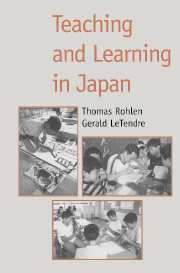Book contents
- Frontmatter
- Contents
- List of contributors
- Introduction: Japanese theories of learning
- Section I Fundamental approaches
- Section II The emotional foundations of early learning
- Section III School and classroom models
- Section IV Path and guidance
- Section V Artistic pursuits – old and new
- Try, try again: training in noh drama
- The Suzuki Method of music instruction
- Conclusion: themes in the Japanese culture of learning
- References
- Index
Try, try again: training in noh drama
Published online by Cambridge University Press: 05 June 2012
- Frontmatter
- Contents
- List of contributors
- Introduction: Japanese theories of learning
- Section I Fundamental approaches
- Section II The emotional foundations of early learning
- Section III School and classroom models
- Section IV Path and guidance
- Section V Artistic pursuits – old and new
- Try, try again: training in noh drama
- The Suzuki Method of music instruction
- Conclusion: themes in the Japanese culture of learning
- References
- Index
Summary
Regimes of training and its theorization in the traditions of noh drama have long been the exclusive and esoteric preserve of professional acting families and have remained, until the twentieth century, generally unknown outside this restricted group. Even after the textual materials relating to such regimes were made more generally available, however, much of the insight they contained was hidden behind a curtain of technical knowledge about stage performance, dramatic convention, and the sociological hierarchy of the noh troupes. Although I am wary of the dehistoricization and decontextualization that can so easily result when we try to look at modern Japan on the basis of traditional, especially textual, materials, I nonetheless regard this as a welcome opportunity to make some observations about training in noh and to speculate on its implications and possibilities outside the world of the theater proper. In the following discussion, then, I will examine the role of training in the arts of noh, with occasional reference to my own modest experience as an amateur who once studied the performance of noh a little in the process of writing my dissertation.
Training and learning
In the context of noh, “training” presents many seeming paradoxes. The devotion to training that is everywhere exhorted in the texts with which we will be concerned could not be effected without a personal, individual commitment, and it would necessarily engage the individual intellect with the highest rigor and intensity; yet the individual must be willing to sacrifice personal judgment, not to mention personal impulse, to a teacher who functions as the embodiment of past mastery in the artistic line.
- Type
- Chapter
- Information
- Teaching and Learning in Japan , pp. 323 - 344Publisher: Cambridge University PressPrint publication year: 1996
- 19
- Cited by



